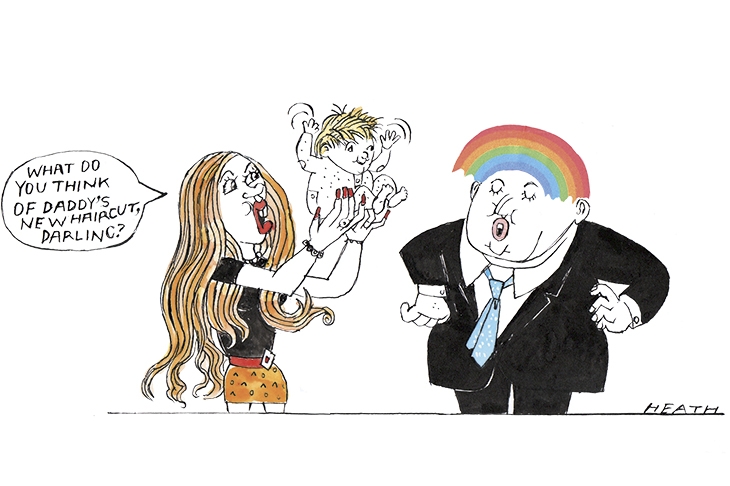Home
The government put its mind to the puzzle of how to get people back to work. Draft advice was for office workers to avoid sharing staplers and to face the wall in lifts. An Ipsos Mori poll found that 61 per cent of people would feel not very comfortable about using public transport. Boris Johnson, the Prime Minister, appeared at a daily coronavirus press conference and said: ‘We have come through the peak, or rather we have come under what could have been a vast peak, as though we have been going through some huge Alpine tunnel, and we can now see the sunlight and the pasture ahead of us.’ Professor Neil Ferguson resigned from the government’s Sage scientific advisory body after accepting visits to his house by a woman friend. In the month to 27 April, 9,176 fines had been issued in England and Wales for breaches of the coronavirus regulations.
The number of people in hospitals and care homes who had died after being suspected of catching Covid-19 reached 28,131 by Sunday 3 May. Though the daily number of new deaths declined, two days later the total was the highest for any country in Europe at 29,427. The recording of deaths had changed, to include those in care homes as well as in hospital; the total by Sunday 26 April was adjusted retrospectively from 20,319 to 23,635. Matt Hancock, the Health Secretary, said that his target of 100,000 tests a day for coronavirus by the end of April had been met by 122,347 being done in the 24 hours up to
9 a.m. on 1 May. In the days after, numbers fell back. The NHS, having rejected an app for contact and tracing developed by Apple and Google, tried out an app of its own on the Isle of Wight. There had been more than 1.8 million claims for Universal Credit benefits since 16 March. The government was paying wages for 23 per cent of workers. Dame Louise Casey was put in charge of a government initiative to get rough sleepers into long-term accommodation once the crisis is over.
Between Thursday and Sunday, 160 migrants were found attempting to cross the Channel. Conor Burns resigned as a trade minister after using his position as an MP intimidatingly in a financial dispute. Boris Johnson and his fiancée Carrie Symonds called their baby Wilfred Lawrie Nicholas, after two of their grandfathers and two doctors, Nick Price and Nick Hart, who had treated Mr Johnson in hospital with Covid-19. Rory Stewart, the former Tory cabinet minister, dropped out of the London mayoral election, in which he was running as an independent candidate. Freddy McConnell, a transgender man who had given birth, lost his case in the appeal court to be registered as the child’s father on the birth certificate.
Abroad
By the beginning of Sunday 3 May, the number of people in the world with Covid-19 who had died totalled 244,663; a week earlier it had been 203,164. The United States had seen 67,444 deaths. Italy came next with 28,710. Italy, Spain and France saw a fall in the rate of new deaths. Brazil and Russia saw a sharp rise. On May 4 New Zealand reported no new cases. A man from Bobigny, in the Paris suburbs, was found to have been suffering from Covid-19 on 27 December. President Donald Trump of the United States was asked by a reporter: ‘Have you seen anything at this point that gives you a high degree of confidence that the Wuhan Institute of Virology was the origin of this virus?’ He replied: ‘Yes, I have. Yes, I have.’ Mike Pompeo, the US Secretary of State, said there was ‘enormous evidence’ of this origin. Unemployment in the United States reached 30 million.
Trains began to carry some of the millions of migrant workers stranded by India’s lockdown to their home regions.. In Kuala Lumpur, police in protective suits arrested hundreds of undocumented migrants. Some mosques in Iran reopened. Ireland was to reopen churches on 20 July. Germany reopened churches but banned singing in them.
Kim Jong-un, the ruler of North Korea, was reported to have been seen in public for the first time in 20 days, cutting the ribbon at the opening of a fertiliser factory. At least 40 were killed when a fuel tanker rigged with a grenade exploded at a market in the Syrian city of Afrin, which is controlled by Turkey and Syrian opposition groups; Turkey blamed Kurdish militants. In Venezuela, a riot at Los Llanos jail, near Guanare, over a lack of food and water, left more than 40 prisoners dead. Scientists in Kenya discovered a kind of microsporidium microbe that protects mosquitoes from being infected with malaria. CSH






Comments